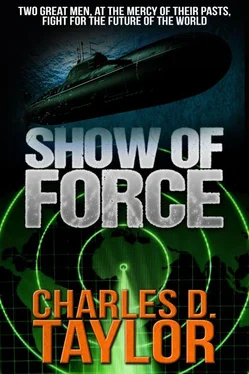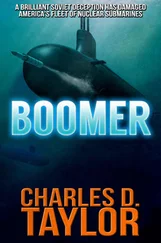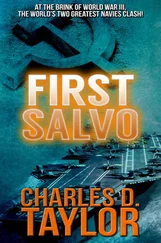"We should be in flag plot now, Admiral. They are so close that we could be under attack at any moment."
"Ah, Svedrov, you have found me." He turned, clapping the younger man on the shoulder. "Stay here for a few moments with me and watch the last of the planes take off. They know I am up here, and they have waved. It will be good for them to see you, too."
They saw the last of the Forgers and Rigas head skyward. This time the aircraft were near enough to their target so that they could stay close to their stations for awhile. This was preferable to the earlier long-distance quick run and return to avoid running out of fuel. Now half of the aircraft were armed to protect the other half. The latter would be making attacks on the surface ships. With the submarines and the surface ships in the area, the Admiral felt that the coordinated attack, would require less air-to-surface missiles, and he wanted these pilots to have a better chance than the last air group. But he feared there would be a ring of carefully guided steel surrounding Nimitz. "All right, my friend, let's join the others in plot. I'm sure David Charles is planning much the same things we are, and I need you to coordinate our defense today. We must save Lenin at all costs, and I'm sure they do not have the surprise for us that we have been saving for them. We have a superior air defense, but they have a great many more aircraft to sacrifice."
Svedrov paused with his hand on the door leading into plot. "You may be sure I will do everything within my power, even to sacrificing the little ships if necessary, as you said." His face was sad and serious.
"I know. That's why I picked you. We will stay close for the next few hours, for they will be the most important in our lives." He extended his arm courteously to his aide as the other man pulled open the door, politely gesturing for him to enter the darkened room first.
"Attack and fighter aircraft launched from Nimitz, sir." He saw the appropriate dots on the board in one color, the approaching submarines in another. Soon a third color would show the cruise missiles he anticipated from the surface craft leading this Task Force 58.
"Lenin has launched aircraft, sir." The announcement redirected David Charles's attention for a moment as he saw the dots move out from Lenin. Right now, however, he was more concerned about the Soviet submarines. They had to be held under by the antisubmarine groups or they would have the opportunity to fire missiles from beyond the surface force's range of detection. Once the subs got closer, the smaller ships could handle them.
"Admiral, those Russian planes are doing pretty much what we're doing ourselves. They're heading for high altitude."
"I was fairly sure that would happen, Bill. The logical thing for the Soviets to do is wait until they can fire simultaneously from three separate geometric locations. Their weapons are designed to do the same as ours are, and their countermeasures are similar also.'We'll have less opportunity to identify individual missiles, select a weapon, and bring them down if they come from the air, the surface, and from underneath all at the same time. With each one operating on a different frequency, thank God it doesn't confuse the computer."
The ships around Nimitz had been stationed with exactly that assumption in mind, and they were assigned sectors for each type of potential attack. The decision of whether to coordinate each sector defense from the master computer or to assign local control to Aegis-configured or even individual ships would come from Bill Dailey. David planned to keep as far from the individual details as possible. He had to evaluate the flow of action, planning his attack around the success of his defense, releasing a ship for total offensive capabilities only when he felt it was not needed for defensive purposes.
"Fighters in contact, sir. They're being fired on by Forgers."
"Remind them their primary targets are the Rigas." He knew the Rigas had been armed to attack Nimitz, and his Tomcats couldn't waste all their missiles on the fighters as Alex wanted them to. Charles's advantage was more aircraft in reserve to attack the Rigas once the Forgers had expended their missiles. But he couldn't ask the pilots to dodge missiles without firing. He had told them in the ready room what they had to do, and they were brave men. "Remind the group leaders to conserve their ammunition. Wait a minute, belay that. Don't tell them a thing!" They were grown men who knew their profession. He would let Bill Dailey do his job and stay out of it. "Sorry, Bill, I always get excited on first contact. Go ahead."
"Yes, sir." He picked up a speaker phone resting near his left arm. "Relax all EMCON. They're on top of us now. Designated ships commence radiating on enemy frequencies." Now those ships he had just directed would begin electronic warfare procedures, emitting signals to distract enemy radar. It would show carrier-size targets in place of an actual destroyer, creating false targets. They would also jam guidance radars attempting to lock on American ships, and fire rockets filled with metal foil that would confuse acquisition radars. The first step had been to meet the attacking aircraft halfway. The second was to confuse those that got through. Now the computer would take over the air attack, assigning targets to perimeter ships, identifying missiles fired at the surface force and assigning ships to bring them down, and finally releasing a ship in extremis from computer control.
Bill Dailey's next move was to check remaining time on station of the helos assigned to hold down submarines. It was important to ensure that relief was at the site before the first helo left. Otherwise, the subs could surface, fire cruise missiles, and dive again in a short time. The responsibility for this phase was turned over to the staff ASW officer, who accepted control with the flick of a switch on the panel before him.
The surface-picture responsibility was retained by the master computer and displayed for Admiral Charles and his Chief of Staff on the huge boards before them. The Soviet force had changed little since the display had been set up more than an hour before, although it was evident that some of the ships in the flank had moved up well ahead of Lenin. "What are those ships moving up, Bill?"
"I'm not sure, sir. They were originally identified as service force, but they seem to be moving too fast for that, don't they?"
"Request that one of the spy planes take some pictures and relay them back here." He looked up at the array of TV screens before them. "Put it on number-three screen."
"Right." Dailey pointed at a nearby officer whose job was to carry out such orders with as little noise as possible. In a moment, the picture flickered on, the screen a snowstorm. There was a change in the background as the spy plane brought its camera into focus on the force eighty thousand feet below. The automatic lens was activated to bring the Russian ships closer, though even after thirty seconds, they were still ants on a vast screen. Gradually Lenin swam into view as an identifying ship.
The Admiral picked up a radio phone. "Have that circuit with the pilot patched in here." He nodded at the comm officer, who was looking over his shoulder at him, holding up the phone with one hand and pointing at it with the index finger of the other. The young officer nodded.
Lenin was becoming clearer on the screen, her island on the starboard side identifiable, as were the circles painted on the deck for aircraft positions. The close-up lens halted when they could identify a figure on the flight deck. There was static from the earpiece of the phone David Charles was holding. "What's his call sign?"
"Spy Two, sir."
Читать дальше












